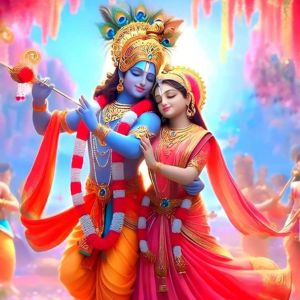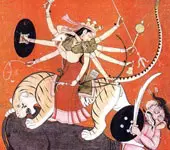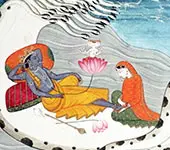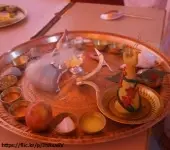Upamanyu
Upamanyu's (उपमन्युः) story from the Adi Parva of Mahabharata is a classic example of Guru-Shishya relationship in ancient India.
Our masters believed that they only have to remove the defects in the student and knowledge will naturally flow into them.
They only have to prepare the students to receive knowledge.
Mahabharata gives three examples: Aruni, Upamanyu, and Veda.
They were students of Dhaumya (अयोधधौम्यः).
But each case was different.
Dhaumya was testing each of them for a different parameter and correcting them.
- Upamanyu - Will the student ever violate the teacher's instruction even if it is a life or death situation?
- Aruni - Will the student follow the teacher's instruction verbatim without applying his own mind to it?
- Veda - Will the student break under too much workload and revolt?
The above qualities are essential if the student has to acquire knowledge in something as profound as the Vedas and Shastras.
Presently, we are only looking at the story of Upamanyu.
Click below to listen to Guru Ashtakam
Upamanyu told to graze his teacher's cows
Serving the teacher is a very important aspect of the Gurukula system.
This is the first step.
Only when the teacher is satisfied with the services of the student, he will start imparting knowledge.
But this has great significance.
This is how the teacher observes the student and identifies the defects in him.
Then in a practical manner, they are corrected.
As soon as Upamanyu joined the Gurukula, Dhaumya told him to take care of his cows.
That will be Upamanyu's duty.
Upamnayu would take the cows out for grazing in the morning and bring them back safely in the evening.
Nothing was mentioned about what he should eat.
One day, Dhaumya asked him: I don't give you anything to eat.
How come you still look so chubby?
Upamanyu: While the cows are grazing, I go to the village and take bhiksha.
That's what I eat.
Dhaumya: Don't you know that whatever you get as bhiksha, you should give it to your Guru?
You are not allowed to eat it.
Upmanyu agreed. From the next day onwards, Upamanyu would bring the bhiksha to the ashrama and hand it over to Dhaumya.
A few days went by.
Dhaumya again called Upamanyu one day: How come you are still chubby?
You are bringing your bhiksha and giving it to me.
Upamanyu: Guruji, I take one bhiksha for you and a second one for myself.
Dhaumya: That is not allowed.
A brahmachari should take only one bhiksha in a day.
They may give it to you out of compassion.
But the resources of families are also limited. When you take a second bhiksha, you may be depriving another brahmachari of his bhiksha.
So, tomorrow onwards, take only one bhiskha and give it to me.
After a few more days, Upamanyu was still looking chubby.
Dhaumya asked him: It looks like you are still taking a second bhiksha and eating.
Upamanyu: No, Guruji.
I don't.
Whenever I am hungry, I drink milk.
Dhaumya: When did I give you permission to do that?
They are my cows.
Their milk belongs to me.
That's stealing.
Don't do that again.
After a few more days, again Dhaumya confronted Upamanyu: You are still getting food.
Are you stealing milk?
Upamanyu: No, Guruji.
After the calves drink milk, the froth keeps dripping from their mouths.
I collect it and drink it.
Dhaumya: You should not do that.
Calves are very kind.
When they realize that you are hungry, they will deliberately drip more froth.
They will have to stay hungry because of you.
Don't do that again.
Upamanyu becomes blind
Upamanyu kept on finding newer and newer ways to circumvent Dhaumya's instruction. Dhaumya went on blocking each one of them.
Now there was nothing left; no bhiksha, no milk.
One day Upamanyu's hunger pranks became unbearable.
He picked up some leaves and ate them.
They were poisonous.
Upamanyu became blind.
As blind Upamnayu roamed here and there in the forest, he fell into a well.
Since Upamanyu did not return in the evening with the cows, Dhaumya went looking for him and found him in the well.
Upamanyu cried: Guruji I have lost my eyesight.
Please help me.
Dhaumya: I won't be able to do anything.
You pray to Ashwini Kumaras.
They are divine doctors.
Only they will be able to cure you and save you.
Dhaumya went away.
Ashwini Kumaras cure Upamanyu
Upamanyu prayed to Ashwini Kumaras from inside the well.
They appeared before him and said:
Now, take this medicine.
You will get back your eyesight.
Upamanyu: No, I can not do that.
I will have to take permission from my Guruji before consuming anything.
Upamanyu has become a perfect student
See, Upamanyu has been refined.
Ashwini Kumaras persisted: You need not.
We had given something similar to your Guruji as well in the past.
He never asked for the permission of his own Guruji.
Upamanyu: Still, I will not take the medicine without Guruji's permission.
Ashwini Kumaras were convinced that Upamanyu had attained perfection as a student.
They told Upamanyu: We are pleased with your dedication to your Guruji and obedience.
We are restoring your eyesight.
Now, you can go back to the ashrama.
Your teeth shall become golden.
It will tell the world that we recognized the great quality in you and blessed you.
By the way, have you noticed?
Your Guruji's teeth are black.
It is because he didn't take his Guruji's permission when we gave him something to eat.
Upamanyu went back to the ashrama and told Dhaumya everything.
Dhaumya became happy that through his persistent efforts, he could transform and refine Upamanyu.
Dhaumya told Upamanyu: Now you can go home.
I am transferring knowledge of all the Vedas and Shastras to you right now, at this moment.
You don't have to stay here and learn anything.
Look at the approach of our wise sages.
They first focused on making the student eligible to receive knowledge.
Then knowledge would flow into him naturally.
Upamanyu gotra
Upamanyu founded the Upamanyu gotra.
They are also called Aupamanyavas.
They are devotees of Lord Shiva and are found mainly in Nepal and the eastern parts of Jammu & Kashmir.
Recommended for you
Shri Krishna Dwadashakshara Mantra

om namo bhagavate vaasudevaaya....
Click here to know more..Why Devi is called Shanti

We are seeing the meaning of the fifth chapter of Durga Saptashati. The 23rd shloka - या देवी सर्वभूतेषु शान्�....
Click here to know more..Satyanarayan Aarti

jaya lakshmee ramanaa. svaamee jaya lakshmee ramanaa. satyanaaraayana svaamee jana paataka haranaa. jaya lakshmee ramanaa. ratana jad'ata simhaasana a....
Click here to know more..
English Topics
Rare Topics
Click on any topic to open
- 237 The Practice of Bhojana Sadhana
- 236 Words of Wisdom - 2
- 235 Defining Goodness - Sanatana Dharma's Perspective
- 234 Vibhishana in Ramayana - A Tale of Morality, Loyalty, and Redemption
- 233 God will not let you break
- 232 A Glimpse into the 64 Arts
- 231 Chembai Vaidyanatha Bhagavatar - A Carnatic Maestro's Musical Odyssey
- 230 Understanding Adhyāsa: A Closer Look at False Attribution
- 229 Is Family's Permission Necessary For Becoming Sanyasi ?
- 228 Faith In Upasana
Please wait while the audio list loads..
30
Ganapathy
Shiva
Hanuman
Devi
Vishnu Sahasranama
Mahabharatam
Practical Wisdom
Yoga Vasishta
Vedas
Rituals
Rare Topics
Devi Mahatmyam
Glory of Venkatesha
Shani Mahatmya
Story of Sri Yantra
Rudram Explained
Atharva Sheersha
Sri Suktam
Kathopanishad
Ramayana
Mystique
Mantra Shastra
Bharat Matha
Bhagavatam
Astrology
Temples
Spiritual books
Purana Stories
Festivals
Sages and Saints

